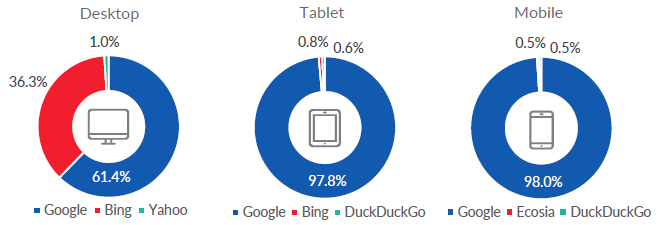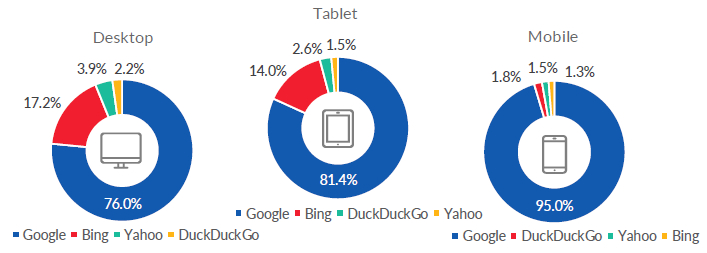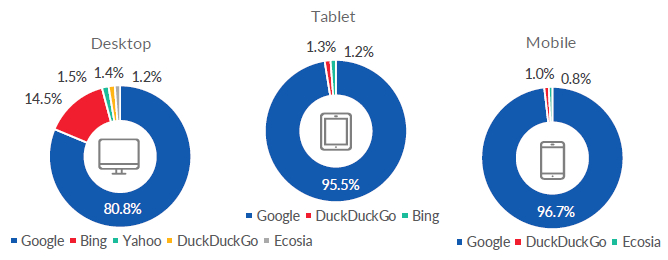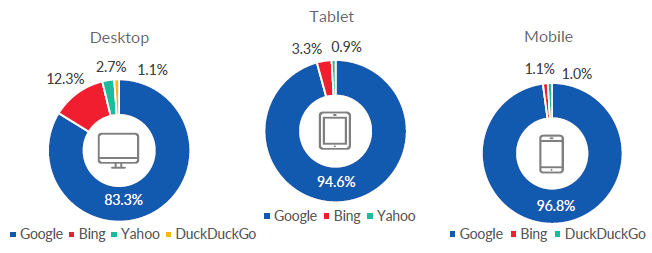
Bing is probably not the first search engine you think of when crafting your SEO or PPC strategies – but there are certain markets where you may actually benefit from targeting this search engine.
Whilst Bing has less than 5% of the search engine market share in most countries around the world, this blog post will look at six markets where it is much stronger – in some cases accounting for almost 1 in 5 searches!
With significant search volumes and likely less competition, targeting Bing could be a smart move in these markets, as you may find it easier to get better visibility compared to Google.
This blog post utilises data from the Webcertain search and social report 2024, so if you want more digital marketing stats and insights from 57 countries around the world, feel free to check it out!

1. Belgium
Bing is the second most popular search engine in Belgium, where it has 18% of the search engine market share – that is almost 1 in 5 searches!

The vast majority of this comes from desktop searches, with Bing accounting for over one-third of desktop search queries in Belgium.

With such a significant share of the search engine market, it is well worth considering targeting Bing as part of your Belgian search marketing efforts.
Just remember that Belgium is a multilingual country with three official languages: Dutch, French and German. Dutch is mostly spoken in the north, French in the south and German in the east.
You should bear this in mind and conduct research into which language(s) your specific audience speaks when creating both your website content and your ads.
2. China
China’s search engine landscape is unique. The local search engine Baidu dominates the search engine landscape with 60.1% of the search engine market share, with Bing following in second place with 16.6%.

Baidu should therefore obviously be the focus of your SEO and PPC efforts. But, with Bing’s share not being insignificant (and growing over time), if you have any spare budget, you may want to consider Bing.
This is especially so given the huge size of the Chinese online population. Over 1 billion people in China are online, meaning that 16.6% of searches is actually a lot of people!
3. United States
Next on our list is the birthplace of Bing: The United States. In the US, Bing comes in second place, accounting for 8.1% of the search engine market share.

However, when you break this down into the different device types, you can see that Bing has a much higher share on desktop and tablet, where it accounts for around 17% and 14% of all searches, respectively.

Again, taking into account the large size of the US online population (over 312 million Americans are online), this means that Bing actually accounts for a lot of searches – making it well worth considering as part of your search marketing efforts in the country.
4. Japan
The Japanese search engine landscape is another one that is unique.
Whilst Google is the most popular search engine, it does not totally dominate the market the way it does in many other countries, with just 77.9% of the market share.
Second-place Yahoo Japan commands a respectable 12.9% of the market, with Bing making up another 8%.

Google and Yahoo Japan should be the focus of your search marketing efforts in the country, but Bing may also be worth considering if you have any extra budget – especially considering that Japan’s online population is over 118 million people strong.
5. Switzerland
Heading back to Europe, the Swiss search engine landscape is quite interesting to look at.
After Google, Bing comes in second place with a respectable 7% of the search engine market share, followed by the privacy-focused search engine DuckDuckGo with 1.2%.

However, when you look just at desktop searches, you can see that Bing actually accounts for 14.5% of searches on desktop in Switzerland.

Just remember that Switzerland is a multilingual country with four official languages: German, French, Italian and Romansh.
You should bear this in mind and research which language(s) are spoken by your target audience/region so that you can create your website content and ads in the most appropriate language(s) that will bring you the best results.
6. Canada
And finally, in Canada, Bing accounts for 6.1% of the search engine market share.

When you look just at desktop searches, this doubles to 12.3%.

Again, given that the Canadian online population totals over 35 million people, that is quite a lot of searches!
Just remember that Canada is a bilingual country, with both English and French being official languages.
You might therefore want to create both English and French content when targeting Canada – just make sure you localise your content to be Canadian English and Canadian French.
Commentary from our in-house experts
Arkadiusz Kostrzycki, Head of SEO at Webcertain says: “Bing Webmaster Tools (for SEO) is quite comprehensive. It provides some unique features, and it is free, so it can provide valuable input from an SEO standpoint.”
Want to learn more?
If you want more international search engine marketing insights, check out the Webcertain search and social report 2024. The report covers 57 markets from all over the world, making it an ideal read for international digital marketers wanting an easy-to-digest overview of each market. Download your copy for free from Webcertain’s Self-learning platform today!
Data sources
All the stats quoted in this blog post are taken from the Webcertain search and social report 2024, which used the latest data taken at the time of writing from StatCounter and Internet World Stats.







